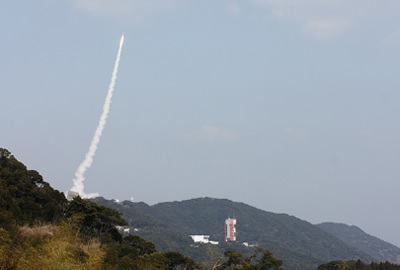News
Successful Launch of World's Smallest Rocket and Microsatellit Updated in April 2018
On February 3, at 14:03 (Japan Standard Time), Japan Aerospace Exploration Agency (JAXA) launched the world’s smallest rocket, SS-520 No.5, from JAXA’s Uchinoura Space Center at Kimotsuki-cho, Kagoshima Prefecture. Seven and a half minutes after the launch, SS-520 had successfully placed a microsatellite into pre-planned orbit.
SS-520 is 10 meters high and shaped like an electric pole with a diameter of about 50 centimeters. It weighs 2.6 tons. Compared to an H2A rocket, it is 1/5 in size and half the size of the small rocket Epsilon. In today’s space industry, demands to launch micro-satellites are rising. To meet such demands, JAXA had improved the existing small solid fuel rocket SS-520 with funds from METI (Ministry of Economy Trade and Industry). With cooperation from private companies, JAXA was able to utilize commercial parts to make the cost-efficient version of SS-520. The first SS-520 was launched back in 1998.
The launch of SS-520 No.5’s predecessor, SS-520 No.4, however, had failed in January 2017. The reason of the failure was short circuit in the airframe which disabled data transmission back to earth. After that, JAXA and other collaborators had fine-tuned most of the parts and prepared for relaunch.
The microsatellite made by the University of Tokyo’s Ultra-Small Satellite Center is called TRICOM-1R (Tasuki). It is a satellite measuring 10 centimeters in width and length. Its height is about 30 centimeters. It only weighs 3 kilograms, but it orbits to transmit data to and from earth and can also photograph a wide span of geographical areas.
http://www.isas.jaxa.jp/en/topics/001233.html









